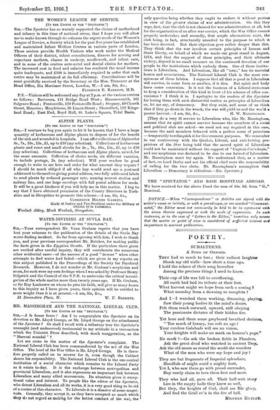MR. MASSINGHAM AND THE NATIONAL LIBERAL CLUB. (TO THE EDITOR
Or THE " SPECTATOR."]
in bonne hetae I Am I to congratulate the Spectator on its devotion to Mr. Lloyd George, or Mr. Lloyd George on the attachment of the Spectator 9 Or shall I recall with a tributary tear the Spectator's unsought (and undeserved) testimonial to my attitude in a transaction which the Unionist Press described, with much exaggeration, as the " Marconi scandal " ?
Lot me come to the matter of the Spectator's complaint. The National Liberal Club has been commandeered by the act of the War Office. The head of the War Office is Mr. Lloyd George. He is there- fore properly called on to answer for it, even though the Cabinet shares his responsibility. The National Liberal Club is the one central institution of a social character which remains to the Liberal Party as it exists to-day. It is the exchange between metropolitan and provincial Liberalism, and it also represents an important link between Liberalism and many allied movements. Its situation gives it excep- tional value and interest. To people like the editor of the Spectator, who detest Liberalism and all its works, it is a very good thing to be rid of a centre of this character. To Liberals it is a disaster of some magni- tude. Generally, they accept it, as they have accepted so much which they do not regard as making for the better conduct of the war, the
only question being whether they ought to endure it without protest in view of the greater claims of war administration. On this they urge, first, that the club is not claimed for war administration at all, but for tho organization of an after-war service, which the War Office cannot properly undertake; and secondly, that ample alternatives exist, the club being, in fact, structurally unsuited to the purpose to which it has been devoted. But their objection goes rather deeper than this. They think that the war involves certain principles of human and State liberty, on behalf of which wo made our great stand in August, 1914, and that the support of these principles, and their ultimate victory, depend in no small measure on the continued devotion of our people to the institutions which embody them. One of these institu- tions is Liberalism. And Liberalism, like all "isms," has its material homes and associations. Tho National Liberal Club is the most con- spicuous of these fabrics. I suppose that all that is good in Liberalism will survive, in some form or another, if it dice. But spirit and body have some connexion. Is it not tho business of a Liberal statesman to keep a consideration of this kind in front cf his scheme of office con- venience ? I think it is. I apologize to the readers of tho Spectator for boring them with such distasteful matter as principles of Liberalism or, lot mo say, of democracy. But they exist, and some of us think that if they go down in the wrack, the war will yield us and the world a [They do a very ill service to Liberalism who, like Mr. Massingham, assume that its spirit cannot survive because the members of a social and political club are asked—we need not say required in this case, because the said members behaved with a perfect sense of patrotisru --temporarily to relinquish it for Government purposes. Wo remember in our controversy with the Quaker, Liberal, and anti-betting pro- prietors of the Star being told that the sacred spirit of Liberalism could not be maintained without the support of " Captain Coe's finals," and our scepticism was declared to be due to our hatred of Liberalism. Mr. Masaingham must try again. Wo understand that, as a matter of fact, on Lord Derby and not his official chief rests the responsibility of calling for the two clubs. Mr. Massingbam's assumption that Liberalism --- Democracy is ridiculous.—ED. Spectator.]


































 Previous page
Previous page